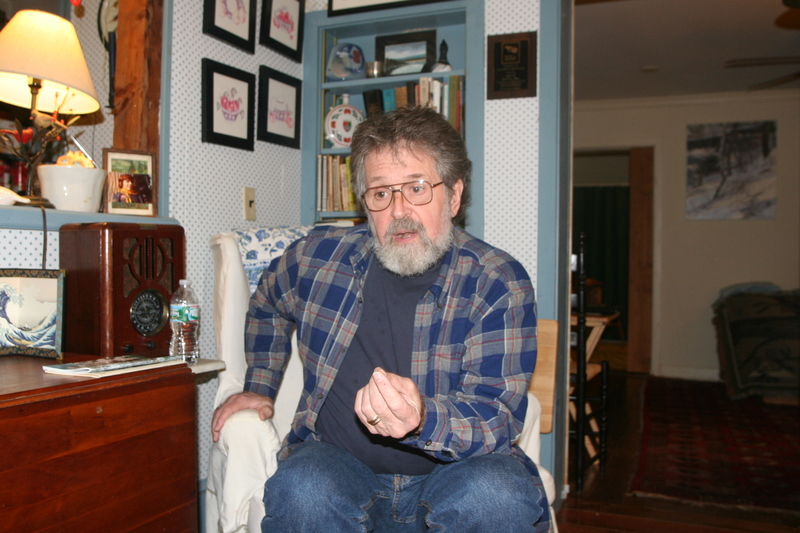Milton’s man of letters continues to write, publish, travel

Milton can lay claim to a man who has made significant contributions to not only the town’s contemporary literature culture but to the entire Cape Region’s.
In 1999, Jamie Brown opened John Milton and Company Quality Used Books. Joanie Martin-Brown, his wife for nearly four decades, suggested the town needed a boutique bookstore and Jamie agreed.
The Milton Chamber of Commerce had moved out of its Federal Street office and the bookstore moved in.
The shop had more used books than anywhere in the surrounding area with the exception of Georgetown, Lewes and Milton’s public libraries.
But unlike the libraries, one could buy any book in the store, and chances were Jamie would just as soon give it to a customer to encourage reading and learning.
“All good deeds have an up side for the doer in a way, I think.” he said.
He said before he opened the store, the area lacked a “cohesive literary presence.” But soon after opening, he said he quickly learned he had misread local readers.
During the store’s opening weekend he sold plenty of pulp fiction and potboiler novels, and also sold several books by Charles Dickens, Ernest Hemingway, Flannery O’Connor and Walker Percy.
“Unless you’re from the Deep South or were taking a contemporary lit survey course in college, Walker Percy is not a person you’re likely to know right off the top of your head and neither is Flannery O’Conner.”
Jamie closed the bookstore about a week before Christmas and put remaining books in storage.
“The building was sold and we were evicted. I think it was time for me to stop, anyway,” he said.
He said both of his hips had been bothering him so he underwent hip-replacement surgery and has been doing well.
Jamie, 64, is big. He jokes about being clumsy as a kid and still clumsy as an adult, he said, mimicking an old man’s shuffle-step. He describes his facial shape as long, which he said is typical of people with a Hungarian heritage, which he has.
Born and raised in Washington, D.C., he’s proud of the city.
“Washington was a great place to grow up. As a kid, I walked everywhere,” he said, remembering the day his dad gave him and two younger brothers bus fare for a ride home from a baseball game.
“We didn’t take the bus. We spent our money and bought pop and a couple candy bars apiece. We walked all over the place. We had fun,” he said.
Washington, D.C., is still a special place to live, Jamie said, and it remained that way even during the crack cocaine epidemic of the 1980s and ’90s.
“Drugs only went down in a couple areas, two or three square blocks. You knew where those areas were and stayed away from them,” he said.
His interest in the world is expansive and ever growing. A voracious reader, he’s able to comment on hundreds of notable books and authors thrown at him.
Such as, “The Catcher in the Rye.”
“Overrated,” he said, about what many consider author J.D. Salinger’s best novel.
Charles Bukowski. “He’s angry,” Jamie said about the beat poet and short story writer who penned the screenplay for the movie “Barfly.”
Jamie has spent about three decades, so far, writing a historical novel about the life of Attila the Hun. From 434 until his death in 453, Attila ruled the Huns in the area where Hungary is today,
To say the book is a tome – its more than 1,600 pages so far – doesn’t do it justice.
Asked the title, he said, “Just call it the big novel in progress about the fall of the Roman Empire as seen from the barbarian perspective.”
Featuring hundreds of characters, mythical and historic, readers might need to take notes to keep track of who’s who.
Those with enough grit to plumb the book’s depth will meet Theodoric and Alaric, kings of the Visigoths, and Geiseric, king of the Vandals.
It features Franks, Burgundians, Alans, Gepids, Visigoths, Ostrogoths, Danhae Saxons, Angles, Jutes, Fomorians and Scotti, from Ireland.
There are also Pictavi from the north of Britain, Hibernians, Armoricans, Iberians, Germani (of all sorts), Roxolanni, Sauromatae, Perzsai, Medae, Heruls, Jaszi, Saraceni, Paropamisae and Sericans and, or course, the crashing fall of the Roman Empire.
“It was upon the rotting carcass of the Western Empire that the nations of France, Spain, Portugal, and England came into being,” Jamie said. “It’s fiction. It’s fiction because I can take those liberties. It’s not made up entirely of whole cloth. It could have happened.
“Every bad thing you’ve ever heard about Attila the Hun came about after he died, in Western Europe,” he said.
In 1998, Jamie founded the John Milton Celebration of Poets and Poetry.
The event showcased Delmarva poets and their poetry, and provided opportunities for the public to learn about and appreciate the craft.
In 2003, the first Dogfish Head Poetry Prize was awarded. Sponsored by Milton-based Dogfish Head Craft Brewed Ales, the $200 cash prize and two cases of Dogfish Head brew attracted numerous starving and thirsty poets.
“I’m an inveterate busybody; pushing nothing more than my own agenda,” he said in response to a comment that his residency in Milton has made a cultural difference.
Further proof that he is a busybody with a plan is his founding of the Broadkill Press, a Milton-based publishing house that prints well-written poetry and short stories.
His most recent vehicle for developing writers is the Broadkill Review, an online publication he edits and manages.
Coming back from a Vietnam War protest only a few months into his first semester at Kalamazoo College in Kalamazoo, Mich., he suffered a severe head injury, ruptured spleen, bruised kidney and two broken ribs when the van he was in rolled several times. He withdrew from school and spent a year recovering.
“That’s when I got my draft notice,” he said of his induction into the U.S. Army during the Vietnam War.
The army asked him what job he wanted, his MOS – Military Occupational Specialty.
He selected cook because as the second oldest of six siblings he had been preparing meals for years.
When officials told him he’d need to sign-up for four additional years and be trained as a chef, a job he already knew how to do, he was shocked
Four years to train for the job, plus two years to fulfill his draft obligation, was too much time, he said.
“‘What have you got that’s good for the two years I’m supposed to be in? They said, ‘Infantry, armor, artillery, or military police.’”
He chose military police, a noncombat specialty that typically involves being shot at less than other specialties.
While in MP training he said, troops learned President Richard M. Nixon had ordered the country’s armed forces to begin pulling combat troops out of Vietnam.
“But we also knew they were still sending people to Vietnam, and we heard scuttlebutt that they were sending military police because we were qualified with every handheld weapon the army had. MPs were going in taking over the combat duties of combat troops,” he said.
Having schemed and apparently failed, it looked like he wasn’t going to avoid becoming one of the sitting ducks.
As an army official read names and where they were being sent, Vietnam, Vietnam, Vietnam, when they got to his name, he heard Alaska.
“The guy standing next to me said ‘Alaska, man you’re going to be cold.’ I said, ‘I can learn to like the cold because no one’s going to be shooting at me.
When its time to be discharged, he said a crusty sergeant gives everyone a last chance to re-up.
“He said, ‘You think the world is waiting for you, and it’s the same world you left, but it’s not there. It’s not the world that’s changed, it’s you.’ I thought, 'Whata you know? You’re a lifer. You haven’t the foggiest idea.' I got home, and he was right.”
He said he found people’s mindset was shallow, and he couldn’t relate. He returned to college to study English, and the GI Bill helped pay for it.
He taught at George Washington University for 12 years, where he lectured on composition; taught advanced fiction and creative writing at Georgetown University and served as an adjunct English professor at the University of Delaware Parallel Program in Georgetown.
Jamie said this year he and Joanie would begin spending summers in western, New York, near an organic garlic farm owned by Joanie’s sister.
They made the decision to go north for the summer after last year’s Cape Region temperatures soared above 90 degrees, and public health officials advised senior citizens to remain indoors.
This summer when the thermometer begins nudging coastal Delaware toward the 100-degree mark, Jamie and Joanie will be relaxing in the comfort of cool, Catskill breezes.
























































